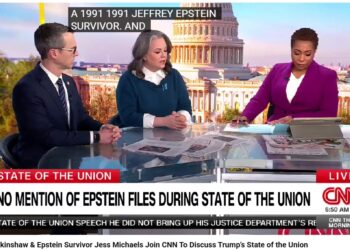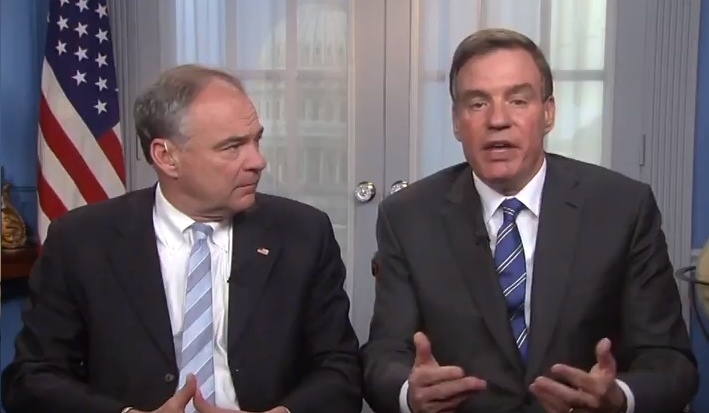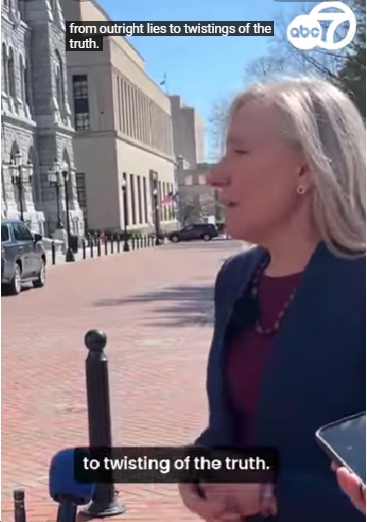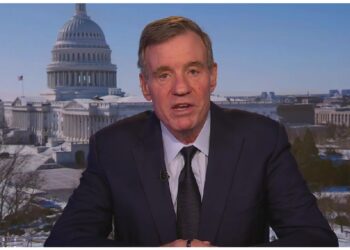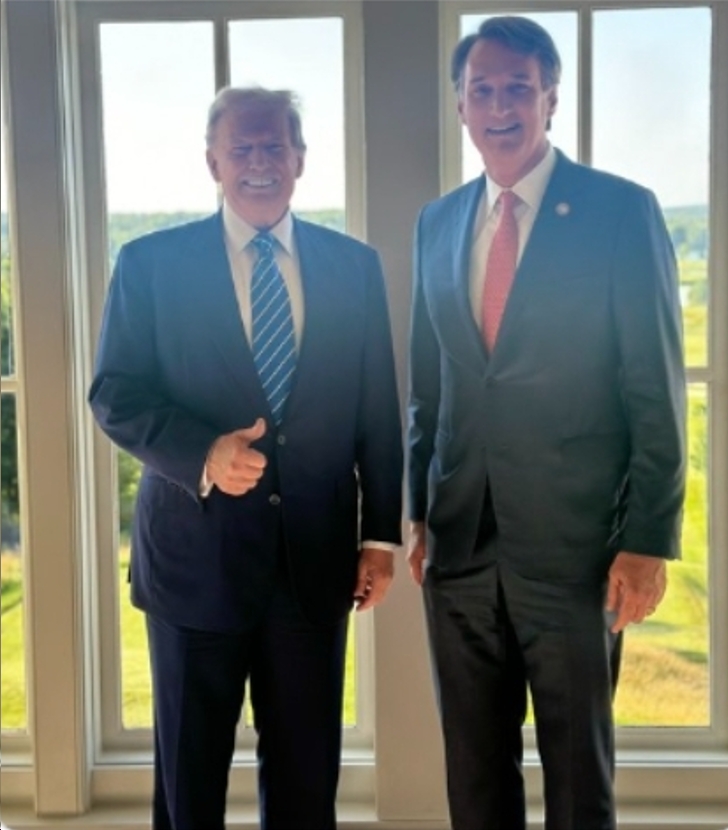From Sen. Mark Warner’s office:
INTELLIGENCE COMMITTEE VICE CHAIRMAN WARNER ON MORNING JOE: “HE GOT PLAYED FOR A FOOL”
WASHINGTON – Today, U.S. Sen. Mark R. Warner (D-VA), Vice Chairman of the Senate Select Committee on Intelligence, appeared onMSNBC’s Morning Joe to discuss the fallout from President Trump’s summit with Russian President Vladimir Putin and his invitation for the Russian leader to visit the White House this fall. Sen. Warner also discussed his vision for the future of the Democratic Party.
On the fallout of President Trump’s summit with Vladimir Putin:
“There are a number of us who warned about this. We said why would you send in Donald Trump, who prides himself on not doing any preparation, against a trained KGB agent, who’s spent 18 years as leader of his country, he would come in prepped. And I was terrified — and I think this may have been what happened — that Putin will come in with facts, with details, might have come in with maps of Ukraine and Syria. And Trump got played, he got played for a fool and he embarrassed our country and frankly embarrassed lots of my colleagues across the board – Democrats, Republicans alike.”
On the Congressional response to the President’s pro-Russian actions:
“We are going to need to figure out ways to put some constraints. We took some actions these past two weeks — reinforcement for NATO, that didn’t do much in terms of Trump’s approach to NATO. We sent out a message saying: ‘no way you’re going turn over American diplomats to Russian officials.’ That was unanimous. But I’d say that builds upon our Senate Intelligence Committee’s work that has reinforced the intelligence community’s conclusion that not only did the Russians intervene in our elections, but they intervened to help Trump and hurt Clinton. That unanimous agreement from our Senate Intel Committee has also been reinforced by Facebook, by Twitter, by Google, who all acknowledged Russians misused their platforms, so I wonder why Mr. Trump continues to be willing to kind of kowtow to this autocrat.”
On President Trump inviting Putin to the White House:
“I think it’s outrageous that the President is rewarding Putin with another meeting before the election, particularly since Dan Coats and other intelligence community leaders, and for that matter the social media platforms, have indicated the Russians will be back. They were successful in 2016 in terms of sowing disarray in our electoral process. And the fact is that in a normal administration with this kind of threat there would be somebody in the White House designated on election security, somebody designated to work better with the social media companies to make sure we’re protected against the misinformation and disinformation, that’s not happening. We’re trying to do that in a bipartisan way out of our Senate Intel Committee, but that’s a huge ongoing concern.”
On the future of the Democratic Party:
“I think that we need to get out of this false choice of red versus blue, or left versus right. I think our politics and the insecurity that Donald Trump has played so well upon is because people are uncertain about the future — globalization, technology, automation. I think the Democrats have got to be willing to lean in to the future. Those issues are not going away. The Democrats ought to be the party that says we want to give everybody in this country an opportunity to earn…earn a good life.”
Video of Sen. Warner’s interview on MSNBC can be found here and a transcript follows.
MSNBC’s Morning Joe
JOE: We have the Vice Chairman of the Intelligence Committee, Democratic Senator Mark Warner of Virginia. It’s interesting, the President is talking about the media, the idiots in the media. Lot of those actually work at Rupert Murdoch-backed media outlets and I guess Donald Trump is calling Rupert Murdoch an idiot, calling Rupert Murdoch the purveyor of fake news because you had the Wall Street Journal, Fox News, the “New York post “Attacking the president for being put Patsy, Putin’s poodle. The most surprising things and I want to get your reaction if you agreed with the Wall Street journal editorial page that congress needs to implement a containment policy, not only for Vladimir Putin, but for Donald Trump.
WARNER: Well, Joe, there are a number of us who warned about this. We said why would you send in Donald Trump, who prides himself on not doing any preparation, against a trained KGB agent, 18 years as leader of his country. He would come in prepped. And I was terrified — and I think this may have been what happened — that Putin will come in with facts, with details, might have come in with a map of Ukraine and Syria. And Trump got played, he got played for a fool and he embarrassed our country and frankly embarrassed lots of my colleagues across the board, Democrats, Republicans alike.
So, we are going to need to figure out ways to put some constraints. We took some actions these past two weeks — reinforcement from NATO, that didn’t do much in terms of Trump’s approach to NATO. We sent out a message saying ‘no way you’re going turn over American diplomats to Russian officials,’ that was unanimous. But I’d say that builds upon our Senate Intelligence Committee’s work that has reinforced the intelligence community’s conclusion that not only did the Russians intervene in our elections, but they intervened to help Trump and hurt Clinton. That unanimous agreement from our Senate Intel Committee has also been reinforced by Facebook, by Twitter, by Google, who all acknowledged Russians misused their platform, so I wonder why Mr. Trump continues to be willing to kind of kowtow to this autocrat.
Does he not understand our allies in Europe are not only defense allies, but also allies in democracy, in terms of belief in a free press, ‘one person, one vote,’ open society— all things that Putin frankly stands against. And it scares the Dickens out of me that it seems like Trump continues to side with Putin.
JOE: And of course, in that press conference again, Donald Trump is talking about how tough he was standing next to Vladimir Putin. But the fact was that he undercut his intelligence community. He said that he had no reason to believe that Vladimir Putin had interfered with the 2016 elections, and that’s something that, again, going back to media outlet that is seen as an ally of Donald Trump, Rupert Murdoch’s “New York Post” attacked him for taking a “see no evil” approach. Is that a fair characterization?
WARNER: I think it’s a fair characterization, because there were no shades of gray here. This was a very weak performance by Donald Trump, kowtowing to a Russian leader. Think about this in historical context. If John F. Kennedy had said and accepted Khrushchev’s allegation there were no missiles in Cuba the country and the world would have been very different. If Ronald Reagan said to then Soviet leader Gorbachev, ‘hey, keep the wall, you figure out when you want to reform your own country,’ our world would be different.
For the last 75 years, America has been the leader of the west standing up to soviet and Russian aggression, that all in many ways disappeared this past Monday
JOE: John Heilemann?
HEILEMANN: My question for you, Senator Warner, is two-fold. The first fold is, what does it say to you that, given what President Trump now says about his grudging acceptance of the intelligence community’s assessment of what happened in 2016 that he is now in the same week turned around and offered not punishment but a reward to Vladimir Putin by giving him a summit in Washington, D.C.? And second, what can we do to find out what else those two leaders talked about in the two hours without anybody else but interpreters present?
WARNER: Let’s take both those. One, I think it’s outrageous that the President is rewarding Putin with another meeting before the election, particularly since Dan Coats and other intelligence community leaders, and for that matter the social media platforms, have indicated the Russians will be back. They were successful in 2016, in terms of sowing disarray in our electoral process. And the fact is that in a normal administration with this kind of threat there would be somebody in the White House designated on election security, somebody designated to work better with the social media companies to make sure we’re protected against the misinformation and disinformation, that’s not happening. We’re trying to do that in a bipartisan way out of our Senate Intel Committee, but that’s a huge ongoing concern.
And then the notion that he was willing, or was going to at least think about, the idea of turning over an American diplomat over to Russian authorities, it’s just — you don’t need to think about that. That’s a straight out no, unacceptable, particularly with the work that Bob Mueller has done with the 12 Russian agents, Russian spies, GRU agents that we’ve got documentation on those individuals — yes, we need to pursue them. I’m not sure that Putin’s going to actually turn them over to us, but it is a warning signal that the Russians were successful in 2016, and every indication is they’ll be back in 2018. And my feeling is again, this President’s getting played.
LEMIRE: Senator, it’s Jon Lemire. There are concerns what the President may have said in the private meeting with President Putin. The only other people there were interpreters. There’s been an idea suggested that a subpoena be issued to the translators to get them to testify as to what they heard, but that of course is not their skill set. It’s a real time thing, they’re translating, they’re not taking notes, they’re not necessarily the most reliable witnesses, so I want to get your take.
Why do you think that would be effective? Is it appropriate, and what sort of precedent might it set going forward for future one-on-one summits between not just this President but future Presidents and other leaders, which is something that happens from time to time?
WARNER: No, you’re right. There have been one-on-one meetings between Russian leaders and American presidents in the past, but generally those American presidents go in prepped, prepared. They have their teams. They think about the meetings with advanced warning. And I think there is a, yes, if the translator can testify or present their version of what’s happened, I think we need to get that, because this is such an extraordinary case. I also think we need a read-out from Mike Pompeo, Jon Huntsman, from other members of the President’s team who were there.
Again, I feel somewhat bad for some of the intelligence community leaders — all who’ve accepted that Russian intervened, like Dan Coats and the CIA director and the FBI director, the NSA director, but then this President constantly undercuts them by his behavior and performance not only in Helsinki, but what’s equally embarrassing is his performance after the fact.
DEUTSCH: Senator, Donny Deutsch, nice to chat with you. You’re at the Opportunity 2020 conference, Democratic leaders getting together to kind of shape where the party is going in 2020, we were talking about messaging earlier. I have a concern when I see kind of the front-runner presidential face is the Bernie Sanders, the Elizabeth Warrens, what happened in one of the New York congressional districts — that there’s a tendency for the party to really lean hard, hard, hard left, which I think is an electoral mistake. I’d love your thoughts on where you’d see this going and what 2020 is trying to do.
WARNER: Well Donny, I think that we need to get out of this false choice of red versus blue, or left versus right. I think our politics and the insecurity that Donald Trump has played so well upon is because people are uncertain about the future — globalization, technology, automation. I think the Democrats have got to be willing to lean in to the future. Those issues are not going away. The Democrats ought to be the party that says we want to give everybody in this country an opportunity to earn…earn a good life.
So that means we need to address not only why Trump is bad — and I think people disagree with Trump, I think they agree with Democratic values in terms of immigration, in terms of fairness. But I think we also have an economic theory that says, yes, we have to address economic inequality — and there are ways we can do that through the government, also ways we can do that in terms of rewarding businesses that look for long-term value rather than short-term. We need to look at a tax code that says if you buy a computer, that’s an asset, you invest in a human being that’s a cost. So we got to think business and government action together.
I think we ought to look at economic insecurity, which I think is one of the great unspoken questions. Nobody’s going to work for the same job for 35 years the way my dad did, yet we had a social contract that basically said the only way you’re going to get benefits is if you work full time. A third of the American workforce today doesn’t work full time. They work part-time, independent contractors. We need a new social contract that basically is built upon portal benefits.
And finally, we need to realize there’s a crisis of opportunity in this country. Parts of this country, New York, Boston, San Francisco, they’re doing great, but something is wrong when 75 percent of all the venture capital goes to three states, Massachusetts, California, and New York, and when less than 1 percent of the venture capital — and I used to be a venture capitalist — goes to African Americans. That is going to present a crisis of opportunity. We’ve got wide swathes of prosperity, but 2000 of the 3,000 counties in America have not seen a net job increase in the last ten years. Democrats ought to be about spreading that opportunity, taking on economic insecurity, yes, taking on economic inequality, but it’s going to take a forward-leaning and frankly pro-growth agenda to do that.
And I might add along the way, something I’ve spent a lot of time on recently the questions around national security. America just spent $713 billion on a defense budget, largest ever. Russia spent $67 billion. I sometimes wonder are we buying the world’s best 20th century military in terms of planes, tanks, trucks — when we’ve seen that conflict in the 21st century particularly with near-peer adversaries like Russia and China, they are our peers in the realm of cyber and disinformation. We need a national security agenda for the 21st century.
JOE: Senator Mark Warner, thanks for being with us, we appreciate it.


